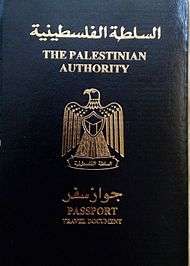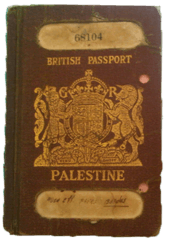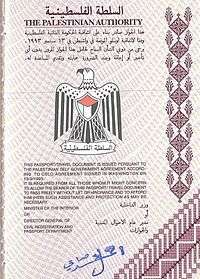Palestinian Authority passport
| Palestinian passport | |
|---|---|
 | |
| Issued by |
|
| Type of document | Passport |
| Purpose | Identification |
| Eligibility requirements | Residents of areas under the Palestinian Authority. |
The Palestinian Authority Passport/Travel Document Arabic: جواز سفر (Jawaz Safar) is a passport/travel document issued since April 1995 by the Palestinian Authority to Palestinian residents of the Palestinian territories for the purpose of international travel.
The Palestinian Authority passport is available to anyone on production of a birth certificate showing that they were born in Palestine. What constitutes "Palestine" for this purpose is not clear. In practice, only residents of areas under the Palestinian Authority jurisdiction can apply. Whether Palestinians born outside Palestine could apply for the passport is also not clear.[1]
However, the passport issuance is subject to additional restrictions imposed by the Israeli government.[1] Israel asserts that the requirement is permitted for security needs under the Interim Agreement.[2]
History

Between 1924 and 1948, the term "Palestinian passport" referred to the travel documents that were available to residents of British Mandate Palestine. Issued by the High Commissioner for Palestine, they were officially titled, "British passport, Palestine". These passports became invalid with the termination of the British mandate on 15 May 1948.[3] Israeli and Jordanian passports were offered to former British Mandate subjects according to the citizenship they acquired in the aftermath of the 1948 Arab-Israeli War. A significant number of Palestinian Arabs, especially in the Gaza Strip and those who found refuge in Syria and Lebanon, remained stateless, as Egypt, Syria and Lebanon did not allow them to integrate as citizens.
The Egyptian-controlled All-Palestine Government issued All-Palestine passports between 1949 and 1959 to Palestinian residents of the Gaza Strip and Egypt. However, passport holders were not permitted to move freely into Egypt. In the meantime, Transjordan annexed the West Bank and Palestinian residents of the West Bank became citizens of Jordan, and were entitled to a Jordanian passport.
After the 1967 Six-Day War, during which Israel captured the West Bank from Jordan, Palestinian Arabs living there continued to have the right to apply for Jordanian passports and live in Jordan. Palestinian refugees actually living in Jordan were also considered full Jordanian citizens. In July 1988, Jordan severed all legal and administrative ties with the West Bank. Any Palestinian living in Jordan would remain a Jordanian citizen; but residents of the West Bank would not.
Jordan continued to issue passports to Palestinians in the West Bank, but they were for travel purposes only and not as indication of citizenship. Palestinians in the West Bank who had regular Jordanian passports were issued with temporary ones upon expiration of the old ones, and entry into Jordan by Palestinians became time-limited and considered for tourism purposes only.
On 2 April 1995, two years after the Oslo Accords of 1993, the Palestinian Authority started issuing Palestinian Authority passports to the public in the self-ruling areas of Gaza and Jericho. These passports retained the personal ID number of the Israeli Civil Administration.[4]
Implications of the passport
Palestinians regard the passport as a 'crucial symbol of nationhood.'[5] The recognition of the passports by other countries has been cited as evidence of recognition by them of the State of Palestine and/or Palestinian nationality and citizenship. As of 1997, Palestinian authorities had not issued a passport in the name of the State of Palestine.[6] While the United States Government recognizes Palestinian Authority passports as travel documents, it does not view them as conferring citizenship, since they are not issued by a government which the U.S. recognizes.[1] Egypt, Jordan and the United Arab Emirates have indicated only (in May 2002) that the passports, along with valid visas or other necessary papers, would allow their holders to travel to their countries.[1]
In October 2007, the Japanese Ministry of Justice announced that Japan would recognize Palestinian nationality with one official saying: "Given that the Palestinian Authority has improved itself to almost a full-fledged state and issues its own passports, we have decided to accept the Palestinian nationality". The decision followed a recommendation by a ruling party panel on nationality that Palestinians should no longer be treated as stateless.[7]
Passport note

The document contains a note on the second page (inside of the cover) stating:[8]
English
- THIS PASSPORT/TRAVEL DOCUMENT IS ISSUED PERSUANT [sic] TO THE PALESTINIAN SELF GOVERNMENT AGREEMENT ACCORDING TO OSLO AGREEMENT SIGNED IN WASHINGTON IN 13/9/1993.
- IT IS REQUESTED FROM THOSE WHOM IT MIGHT CONCERN TO ALLOW THE BEARER OF THIS PASSPORT/TRAVEL DOCUMENT TO PASS FREELY WITHOUT LET AND HINDRANCE AND TO AFFORD HIM (HER) SUCH ASSISTANCE AND PROTECTION AS MAY BE NECESSARY.
See also
References
- 1 2 3 4 INS Resource Information Center (May 20, 2002). "Palestinian Territory, Occupied" (PDF). UNHCR. Retrieved 2009-01-24.
- ↑ UNHCR 17 Dec 1998: Palestine/Occupied Territories: Information On Passports Issued By The Palestine National Authority
- ↑ Artz, 1997 p. 77.
- ↑ Parsons, Nigel Craig (2005). The politics of the Palestinian Authority: from Oslo to al-Aqsa. Routledge. p. 298. ISBN 978-0-415-94440-3. Retrieved 2010-01-25.
- ↑ Jordan Times, 25 Jan. 1995
- ↑ Segal in Kapitan, 1997, p. 231.
- ↑ See Japan to recognize Palestinian nationality, KUNA, 10/5/2007 ; Yomiuri, Government to recognize Palestinian ‘nationality’, Saturday, October 6, 2007; and Japan News Review, Government to recognize Palestinian ‘nationality’, October 6, 2007,
- ↑ http://www.uscis.gov/portal/site/uscis/menuitem.5af9bb95919f35e66f614176543f6d1a/?vgnextoid=8d9253bc46d8d010VgnVCM10000048f3d6a1RCRD&vgnextchannel=d2d1e89390b5d010VgnVCM10000048f3d6a1RCRD